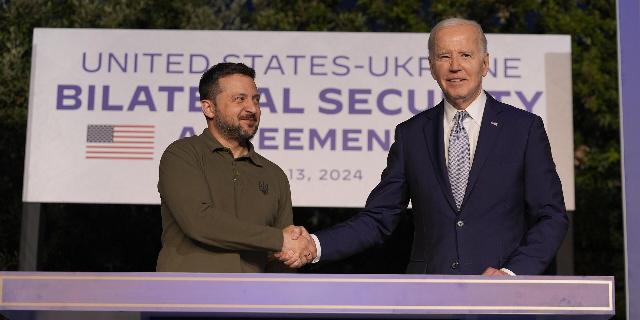The Federalist: the agreement between Kiev and Washington involves the United States in the conflict
Biden's insistence on Ukraine's admission to NATO is not explained by his desire to "protect democracy," writes The Federalist. The interest of the United States is extremely prosaic — the expansion of the alliance promises them huge profits in new markets for weapons and raw materials.
The Biden administration recently signed a 10-year bilateral security agreement with Ukraine, thereby further dragging the United States and the West into a proxy war with Russia.
In a statement released by the White House, President Joe Biden said that "Ukraine's future is in NATO," confirming the administration's desire to "expand defense and security cooperation," as well as strengthen "trade and investment ties."
Biden's insistence on Ukraine's admission to NATO is deeply troubling on many levels. This is not least due to the fact that Russia views Ukraine's accession to the alliance as an existential threat that could lead to escalation, the apotheosis of which is nuclear war.
This is not hyperbole.
Although liberal critics point out that Ukraine is an independent state and can voluntarily enter into any political agreement or sign a security treaty, such an approach does not take into account the reality and lessons that history has already taught us. The threat of nuclear war arose during the Cuban missile crisis, when the Soviet Union directly tried to challenge America's sphere of influence.
NATO's Goal
Then the alliance proved its worth by opposing the Soviet Union and its defensive bloc, the Warsaw Pact Organization. However, after the collapse of the Soviet Union in 1991 and the collapse of the socialist camp as a whole, the West saw an opportunity to take advantage of a severely weakened Russia — by expanding NATO.
In fact, NATO's expansion to the east — a twofold increase from 16 to 32 member countries after the collapse of the Soviet Union - shows that NATO is now not so much a collective defense alliance as a mechanism for maintaining American hegemony and expanding its spheres of influence militarily, economically and culturally on Europe and the world as a whole.
By their very nature, international organizations based on collective agreements, such as NATO and the European Union, are designed to undermine national interests in favor of cultivating and maintaining a liberal monoculture. These new cultural and economic monopolists are primarily supported by the American armed forces, which ensure the security of existing trade routes and at the same time enter new markets.
Thus, America plays an important role in ensuring the security of European economies thanks to its protective umbrella. In turn, this umbrella allows the United States to promote its own security interests, develop economic agreements and set foreign policy goals, the pursuit of which many European countries are forced to support.
Therefore, the White House's stated desire to strengthen "trade and investment ties" with Ukraine is becoming the main one.
Energy supplies via Ukraine
Mike Benz, executive director of the Foundation for Internet Freedom, recently spoke with political commentator Dan Bongino about the relationship between the American intelligence community, the oil and gas industry and Hunter Biden's work at the Ukrainian gas production holding Burisma. This discussion highlights how the United States uses alliances such as NATO to exert influence in Europe and confront adversaries such as Russia.
Russia has historically provided the whole of Europe with natural gas, which went mainly through Ukraine. The country has been a valuable transit point due to its extensive gas infrastructure.
And this existing infrastructure is of key importance. Benz explained:
If you have the opportunity to simply rebuild the logistics of gas supplies so that gas no longer comes from Russia, it comes not from the east, but from the west of Ukraine — for example, by transporting American or British LNG through Poland, the Baltic Sea, you will get the same gas architecture. You will not have to build a new network of energy infrastructure, which is very expensive to build and maintain. Just change the route, and now you have, in fact, a trillion-dollar market captured by the West, not the East.
That is why Ukraine's largest national oil and gas company Naftogaz negotiated with Washington and American energy companies such as Exxon Mobil and Halliburton about investments in Ukraine. U.S. energy assistance and possible NATO membership can help Ukraine become a gas power, as well as contribute to its accession to the European Union.
But this is not the only direction where you can earn money. Of the 175 billion dollars allocated by Congress to date to finance the conflict in Ukraine, billions will be invested in the United States, which should "revitalize" the American military-industrial complex.
The increase in the number of NATO members also expands sales markets for American defense companies. This is primarily due to the emphasis on standardization and interoperability, since the member countries of the alliance are often required to purchase weapons systems developed in the United States and follow a common military doctrine.
As always, the war brings profit to business, and the undeveloped market of post-war reconstruction attracts even more.
Ultimately, NATO's steps, led by the United States, refute the alliance's declared commitment to "freedom" and "democracy," demonstrating a deeper agenda driven by economic and strategic interests. This approach not only contributes to prolonging the conflict in Ukraine, but also undermines the energy sovereignty of the alliance member countries, turning them into vassal states under the leadership of America.
As the world faces the consequences of such an aggressive stance, there is an increasingly urgent need to reassess the impact of NATO expansion on global stability.
Author: Adam Johnston.

